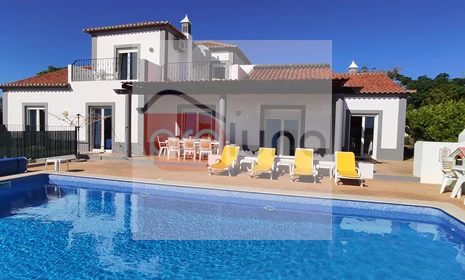Buying property in Portugal as a Foreigner…
With an attractive climate, beautiful coast and friendly, safe communities, Portugal is a top destination for expats looking to relocate, either for work or retirement.
If you're planning on moving to Portugal, you'll need to find a place to live. Around 74% of people own their own homes in Portugal, which is higher than average homeownership rates in many other countries around the world. There are no restrictions to buying a home in Portugal as a foreigner and the real estate sector is well developed.
Many foreigners have settled in Portugal or invested in a second home there. If you’re thinking of doing the same, then you’ll need to know a bit about how to buy a property in Portugal as a foreigner, and how the process typically works. Here’s a handy guide, covering everything you need to know.
How easy is it to buy property in Portugal as a foreigner?
There are no special requirements nor paperwork for foreigners wishing to buy property in Portugal, so you shouldn’t have any issues.
You must have a fiscal number (Numero de Contribuinte) to purchase a property in Portugal. You can get this through the local tax office or it's issued when you open a local bank account.
Just to add: If you are visiting Portugal to view potential properties, with the intention to buy but have to return to your home country prior to finding or completing on a property, you can give your Lawyer Power of Attorney, which grants the lawyer the permission to act on your behalf to complete on a property purchase. With an agreed and signed power of Attorney, your chosen lawyer can sign paperwork and contracts for you to complete the process.
Buying property in Portugal after Brexit.
The good news for prospective property buyers is that Brits can still buy property in Portugal. This is because as we’ve mentioned, there are no restrictions on foreigners buying houses, apartments and land in Portugal.
And as non-EU citizens, British expats may also be eligible to apply for Portugal’s Golden Visa scheme.
Can I buy property in Portugal and get residency?
One of the reasons Portugal is such an attractive place for foreign buyers is its Golden Visa program.
If you buy a home in Portugal as a third country national (which is what UK citizens are since Brexit) and you spend at least €500,000, (This could be lower depending on the property type and location) you might be entitled to a Golden Visa. This grants you up to five years residency, after which you may be entitled to permanent residence status.
Buying property in Portugal - pitfalls to avoid
One of the main pitfalls to avoid when buying property in a foreign country is scams. Luckily, these are rare but there are a number of things you can do to avoid them.
Firstly, make sure your chosen Real Estate Agent is properly registered. All agents have to be registered with the proper body (known as the Associacao de Mediadores Imobiliario) and hold a licence number. Check out your agent’s credentials by talking to the Instituto da Construção e do Imobiliario (the body responsible for construction and realty).
When it comes to finding your own independent solicitor it’s also important to do your research carefully. You should know that there are both professionals known as a solicitador and an advogado in Portugal. A solicitador is a conveying specialist, and an advogado is a qualified lawyer.
In most cases, an advogado, although more expensive, will be the better choice when arranging your house purchase. Don’t feel you have to take the recommendation of your broker or the seller - your lawyer will work for you, so you must find someone who you’re comfortable with.
How do I choose the right property?
Property types
You'll have a wide choice of apartments, houses or even land if you want to build your dream home in Portugal yourself. Naturally, you'll find more flats available in built up areas and cities, with houses and villas more readily available in newer developments, in the suburbs and in towns and villages.
Following an increase in new construction in the cities and the coastal areas along with Algarve in particular, you'll find a good mix of older properties and new-build condos here.
Condition of the property
It’s a smart idea, though not required by law, to get a survey done on any property you choose, before you commit to buying it. Older houses in particular can have hidden problems which are costly to fix. Your solicitor can help you find a registered surveyor.
What are the steps to buying a property in Portugal as a foreigner?
Buying a property in Portugal isn’t too dissimilar to buying a home elsewhere in Europe or North America. You’ll need to:
- Decide which mortgages might suit you and get an offer in principle so you have a budget in mind, the sooner the better!
- Find the property you want to buy
- Engage an independent solicitor to help check contracts and make sure the property is surveyed
- Make an offer the seller agrees to
- Go back to the bank and finalise the mortgage
- Sign the Contrato de Promessa de Compra e Venda (sale contract) with the notary
- Pay your deposit and agree a completion date with the seller
- You're now liable for property transfer tax (Imposto Municipal sobre Transmissões)
- The last step is to sign the Escritura Publica de Compra e Venda (Deed of Purchase and Sale) and have the property registered in your name.
- The important point to remember, is to allow a figure of 10% of the purchasing costs for the fees: Property tax, stamp duty, lawyers fee and Notary etc. The true figure is generally less than 10% but commonly advised!
What are the legal requirements to buying a property in Portugal?
One of the most important legal requirements for buying property in Portugal is to use a notary.
The notary is different to your independent solicitor, as they work as a middleman on behalf of the state, taking responsibility for things like checking the Land Registry (Conservatória de Registo Predial) and Inland Revenue (Repartição de Finanças) to make sure the property can be legally sold and check for any restrictions on its use. You'll then sign the contracts with the seller, witnessed by the notary.
How do I get a bank loan/mortgage in Portugal?
Portugal has a sophisticated banking system with plenty of choice in local and international banks. The largest banks include Santander, Millennium BCP, Novo Banco, BBVA and Bankinter. You might recognise the brands as many have a global presence.
For example, global banking giant Santander has a Portuguese operation, offering many of the same accounts and deals that you can get elsewhere in the world. If you have an account with them already, you may find it easier to switch to their local business in Portugal.
In general, Portuguese banks usually only offer loans of between 65% and 75% of the purchase price to non-residents⁹.
When you’ve chosen the mortgage product that works best for you, you’ll need to make your application. As in most places, this’ll mean that you have to arrange a stack of paperwork and visit the bank in person to get approval.
In many cases you’ll have to pay a hefty application or ‘commitment’ fee (in the region of €600 or more⁹) to secure your mortgage. Each bank will operate slightly differently, so call your local branch to get the details. You should also check if there’s an English speaking staff member who can help you, as this isn’t always the case.
It’s worth getting a mortgage agreement in principle before you go on too far with your property search, as this will give you a more solid idea of what you can afford.
How do deposits and down payments work?
You’ll pay a deposit of at least 20% of the sale price at the point of signing the initial agreement to purchase your new home (Contrato de Promessa de Compra e Venda). This agreement must also be notarised before you can move on with the process.
If you’re not yet in Portugal, you might have to pay your deposit from abroad. This might mean making an International money transfer to cover the deposit amount. If you’re transferring a large amount of money across currencies, it’s important you get the best deal available.
One smart option is to get a multi-currency account with a currency specialist. With this, you can hold multiple currencies all in one account (including GBP, USD and EUR). It’s like having a local bank account which you can use to pay like a local, wherever you need it.
What kind of taxes and fees will I need to pay?
Although you're liable to fees as a buyer, these vary according to the circumstances. The main cost is IMT transfer tax, which is scaled according to the purchase price of the property. However, you won’t need to pay IMT on the first €92,407 if the property will be your main residence². Talk to your solicitor about the costs likely to be levied in your circumstances.
Fees and taxes include:
- Stamp duty: 0.8% the value of the home.
- Property transfer tax: Imposto Municipal sobre Transmissões (IMT): This is calculated on a sliding scale depending on the cost of the home, from 2-8%. A higher tax is payable if the property is a second home.
- Notary and land registry fees: These are usually combined and come in at around 0.2% to 1.2% of the property cost.
Estate agents fees are usually paid by the vendor (seller).
Paying for your Portuguese property from abroad? Save money with a currency exchange specialist.
If you’re arranging your property purchase in Portugal while still in the UK, you’ll need a safe, reliable and preferably low cost way to send over fees, deposits and other payments.
If you use your bank, you could be stung by high international transfer fees and unfavourable exchange rates - which means your new Portuguese home costs you more to buy.
Buying a property is a big and exciting step but navigating the system in a new country can be a challenge. Luckily, buying your dream home in Portugal should be fairly straightforward if you follow the general guidelines above.
Allow Proluna to help you with finding, buying and settling into your new home in Portugal.
Call our team today on +351 281 023 461
This publication is provided for general information purposes only and is not intended to cover every aspect of the topics with which it deals. It is not intended to amount to advice on which you should rely. You must obtain professional or specialist advice before taking, or refraining from, any action on the basis of the content in this publication. The information above does not constitute legal, tax or other professional advice. Prior results do not guarantee a similar outcome. We make no representations, warranties or guarantees, whether express or implied, that the content in the publication is accurate, complete or up to date.

